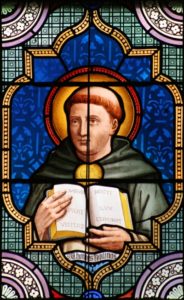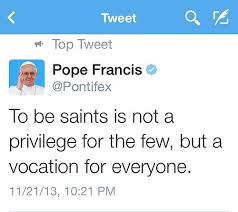Today is the Feast of Saint Thomas Aquinas. I thought I would use this occasion to share how this great man has changed my life. Although he walked this earth during the 13th century, he had a life-changing impact on my life in this 21st century.
 As I was studying for my Masters in Pastoral Theology, at Saint Joseph’s College, I needed to take the core course in Moral Theology. It was the last of the core courses to take before embarking on the electives. At this point in the process, I still had no idea what God wanted me to do with my life, after obtaining my degree. I was concerned about what electives to take, without a game plan for my future. Then, within the Moral Theology course, I met Saint Thomas Aquinas, via the study of his masterpiece, Summa Theologica. Saint Thomas Aquinas opened my eyes to see what it truly meant when Christ said that He is the “Way.” You see, Aquinas’ Summa Theologica goes into great depths to explain the various virtues. He devotes an entire subset of the masterpiece to logically explaining why we should embrace virtue. Through reading Aquinas’ masterpiece, I came to understand that by embracing virtue we can live happier lives. It is through the turning away from vice/sin, that we turn toward God and virtue, for they are polar opposites to each other.
As I was studying for my Masters in Pastoral Theology, at Saint Joseph’s College, I needed to take the core course in Moral Theology. It was the last of the core courses to take before embarking on the electives. At this point in the process, I still had no idea what God wanted me to do with my life, after obtaining my degree. I was concerned about what electives to take, without a game plan for my future. Then, within the Moral Theology course, I met Saint Thomas Aquinas, via the study of his masterpiece, Summa Theologica. Saint Thomas Aquinas opened my eyes to see what it truly meant when Christ said that He is the “Way.” You see, Aquinas’ Summa Theologica goes into great depths to explain the various virtues. He devotes an entire subset of the masterpiece to logically explaining why we should embrace virtue. Through reading Aquinas’ masterpiece, I came to understand that by embracing virtue we can live happier lives. It is through the turning away from vice/sin, that we turn toward God and virtue, for they are polar opposites to each other.
I left a 36-year banking career to return to school to obtain my Master’s Degree, because I wanted to connect the dots for people; to show them what they can do that is right, and in the process, live a happier life. Saint Thomas Aquinas provided me with the direction I needed. He gave me the answers on how to connect the dots! With this knowledge, God began to reveal parts of His plan for me. The Holy Spirit inspired me to write a children’s book on the virtue of patience, and to start a blog, writing about virtue. Then He opened the door to teaching at St. Joseph’s College. But He didn’t stop there! He continues to use me to fulfill His plan. Occasionally, He has me speak on the virtues, or other topics, at parishes. Most recently, God asked me to be the RCIA Coordinator at my parish, where I am given the opportunity to share the Catholic “Way” of living with those seeking to enter into full communion with the Catholic Church.
I don’t know what else God has in store for me, but I do know this: I owe a great deal of what I have accomplished to studying the teachings of Saint Thomas Aquinas, and to receiving the grace of Christ.
The souls of Saints live on for eternity. In the case of Saint Thomas Aquinas, we are also blessed to have his literary works live on as well. What Saint Thomas Aquinas taught in the 13th century was as relevant then as it is now. When a Saint provides timeless, unwavering teaching, aimed at bringing you closer to God, then you know it was inspired by the Holy Spirit. I am grateful for all that Saint Thomas Aquinas has done for me.
May the Lord shine His face on Saint Thomas Aquinas! Saint Thomas Aquinas, pray for us!
Virginia Lieto teaches theology for Saint Joseph’s College Online. She is the author of children’s book Finding Patience and blogs at www.virginialieto.com.

